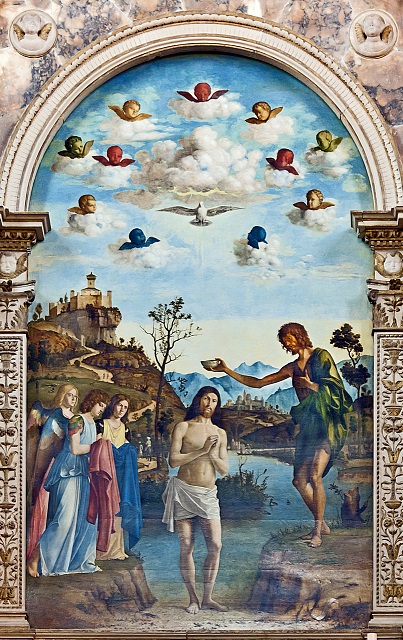Bethlehem Lutheran Church, Lebanon, OR
Readings: Genesis 1:1-5| Romans 6:1-11 | Mark 1:4-11
Text: Mark 1:4-11
Now, you may think this is ten days late, but today we’re going to talk about beginnings.
In the Beginning – Genesis 1:1-5

The Old Testament reading is the very beginning of the Bible. In fact, that’s the first Word written in the Torah—b’reshith bara Elohim,[1] In the beginning, God made. This sets the scene as we creatures of God are growing in the grace and knowledge of our Creator. God is there making. The Father is creating, the Spirit is hovering over the unordered waters, and out of that primeval mass, God the Word goes to work: “Let there be light,” and there was light. As we heard from John on Christmas Day, “All things were made through him, and without him was not any thing made that was made. 4 In him was life, and the life was the light of men.” (John 1:3-4)
God creates through the Word, and the light is good. Then God does something else: “And God separated the light from the darkness.” Where God is creating, it is good, and where God is, there is light and life.
God speaks, and life results, so that by the end of 6 days, God looks at all His work and says, “Behold! It is very good!” (Gen. 1:31) He rests on the 7th day, stops speaking & creating. What will become of this creation, so newly made?
We know – Another voice spoke, which set the creature against its Creator. The first of many failed attempts to be like God, for that speaking brought death, and. Their eyes looked upon evil and called it good. Darkness enshrouded the sons of God, the sons of light.
The Lord hovered over the waters again in the flood, but that time he brought destruction and salvation. He waited for the creatures to come back, but they would not. He preached their destruction through Noah, but to no avail. So the Spirit took away life, and everything that had the breath of life perished (Gen. 7:22)…but God saved Noah and his family. But God was not done speaking…
In the Beginning of the Gospel – Mark 1:4-11

The Gospel of Mark begins much like the first Book of God’s Word: “The beginning…of the good news of Jesus Christ, the Son of God” The beginning of the good news is a new creation account.
9 In those days Jesus came from Nazareth of Galilee and was baptized by John in the Jordan. 10 And when he came up out of the water, immediately he saw the heavens being torn open and the Spirit descending on him like a dove. 11 And a voice came from heaven, “You are my beloved Son; with you I am well pleased.”
God the Father is there. God the Spirit hovers over the waters, the ordered creation—yet disordered and made chaotic by sin and the devil—the waters of the Jordan. There is no more delay, no more silence. The heavens are “torn open”—not for judging wicked man as in the Flood, not for prophetic visions (Ezek. 1:1)—but for creation and life:
God speaks again, but this time He speaks to a Man. He does not say, “Let there be” because He is not creating from nothing. He is recreating, restoring, returning life that the devil and sin stole away.
He indicates where this new creation is to be found: “You are my beloved Son; with you I am well pleased.” You are life. You are very good. You are Jesus, “who will save His people from their sins.” (Matt. 1:21) And as God first separated the light from the darkness, so He is doing again.
In Your Beginning – Romans 6:1-11

The reason we celebrate this Baptism of the Lord God is because He has also made that new creation ours. The Epistle from Romans 6 says,
3 Do you not know that all of us who have been baptized into Christ Jesus were baptized into his death? 4 We were buried therefore with him by baptism into death, in order that, just as Christ was raised from the dead by the glory of the Father, we too might walk in newness of life. 5 For if we have been united with him in a death like his, we shall certainly be united with him in a resurrection like his.
We are brought into those new-creation waters when we are baptized into Jesus Christ, in the Name of the God the Father who creates, God the Son who redeems, and God the Holy Spirit, who sanctifies. St. Paul writes about Baptism in Titus 3, and says, “he saved us, not because of works done by us in righteousness, but according to his own mercy, by the washing of regeneration and renewal of the Holy Spirit.” (Titus 3:5) There, it says very clearly that these waters are a washing of re-genesis and newness-from-above. All that belongs to the old creation is made new—or at least it is the beginning for us.
The beginning of your good news of Jesus Christ is that God has saved you by giving you a new birth by water and the Spirit, and heirs of a new creation that is to be complete when the Lord Jesus comes again on the clouds of heaven.
But we ask, can’t He come any quicker? Why does He leave us in this old creation? This sin-rotten flesh? It is His mercy that He does shorten our time in this life, because He hears our groaning, and He sees our weakness.
St. Paul urges us about the weakness of our flesh, because our flesh is drawn toward the darkness: “What shall we say then? Are we to continue in sin that grace may abound? 2 By no means! How can we who died to sin still live in it?” How can we, who are a new creation through Christ, go on living as if something monumental and eternity-changing didn’t happen in the baptismal font? That would be to despise the restoration for which the creation has been longing for millennia! That would be to reject the revelation of God’s mighty work in the Jordan, on the cross, in the empty tomb, and as He now stands interceding for the saints at the right hand of God! How can we, the children of light, dwell in the darkness of fallen man, reveling in blasphemy, astrology, choosing partners after our own lusts, and every manner of evil we see embraced around us? “And such were some of you. But you were washed, you were sanctified, you were justified in the name of the Lord Jesus Christ and by the Spirit of our God.” (1 Cor. 6:11) This is the beginning to which He daily brings you, so that you may die to the darkness and live in the light.
Likewise, He hears our groans under the weight of darkness, as we cry to Him day and night. “For we do not have a high priest who is unable to sympathize with our weaknesses, but one who in every respect has been tempted as we are, yet without sin. 16 Let us then with confidence draw near to the throne of grace, that we may receive mercy and find grace to help in time of need.” (Heb. 4:15-16)
Fear not, and be of good courage, children of God, children of light, brothers and sisters in the Lord Jesus Christ. God has called you out of darkness into His marvelous, eternal light (1 Pet. 2:9). Your sinful flesh will pass away. The devil will surely be cast out. “The Son of Man will send his angels, and they will gather out of his kingdom all causes of sin and all law-breakers, 42 and throw them into the fiery furnace. In that place there will be weeping and gnashing of teeth. 43 Then the righteous will shine like the sun in the kingdom of their Father.” (Matt. 13:41-43)
This is your beginning, but you will rise with Christ so that there will be no end. Thanks be to God! Amen.
[1] The Hebrew name for the Book of Genesis is Bereshith, the first word. Interestingly, Genesis, which means to bring forth, would be an accurate translation of the second word, bara, which is uniquely used of God’s creation out of nothing (ex nihilo).




